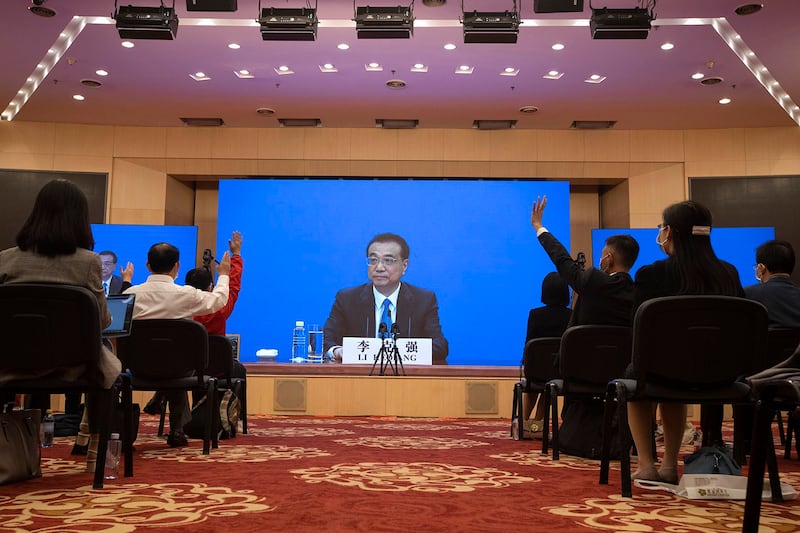China announced on Monday that it was canceling an annual news conference by Premier Li Qiang -- which for years offered journalists a rare opportunity to put questions to a senior Chinese leader, albeit at a carefully staged and edited event rounding off the National People's Congress.
Li will not be holding the traditional news conference at the close of the annual parliamentary session, which opens in Beijing on Tuesday, something that has happened every year since 1993, National People's Congress spokesperson Lou Qinjian said.
The move would shield Li from having to answer questions deemed too politically sensitive for a live televised event, current affairs commentator Johnny Lau said.
"The cancellation of the premier's press conference naturally reduces Li Qiang's public exposure," Lau said. "Canceling it avoids a potentially embarrassing situation if foreign journalists start asking about sensitive topics."
While most of the questions aimed at the heads of the Chinese government were carefully pre-screened by officials, the annual news conference has, from time to time provided the outside world with glimpses into the mindset of China’s usually secretive leadership.
In 1998, then-premier Zhu Rongji responded to a question about the 1989 Tiananmen massacre, saying that the authorities had taken "decisive measures" to stabilize the situation, describing the weeks-long student-led pro-democracy movement on Tiananmen Square as "political turmoil."
And in 2020, then-Premier Li Keqiang made waves by telling the annual press conference that there were still 600 million people on an extremely low income in China, a comment that was seen as a veiled rebuke to President Xi Jinping's claim to have eliminated poverty.
Li Keqiang's unexpected death in October 2023 prompted a mass outpouring of public grief across China, which commentators said was an expression of dissatisfaction with Xi's leadership and economic policy.

A veteran Chinese journalist who gave only the surname Shi for fear of reprisals said Li Qiang is likely seeking to avoid searching questions on the economy from foreign journalists.
"China's economic decline since the zero-COVID policy has been serious," Shi said. "Li Qiang doesn't really want to answer a bunch of questions from Western journalists on topics like the shifting of supply chains, or the collapse of real estate companies and private enterprises."
Other unwanted topics might include unemployment and a rapidly aging population, Shi said.
Foreign ministry spokesperson Mao Ning declined to comment on the cancellation of the press conference at Monday's briefing, saying only that concerns about the move were "unnecessary."
Dutch journalist blocked
The move came as foreign correspondents in China called for better treatment of journalists after authorities in the southwestern city of Chengdu shoved a Dutch journalist to the ground and detained him and his cameraman as they tried to film a protest, in a move that foreign correspondents in the country said is becoming increasingly common across the country.
The incident highlighted ongoing harassment of foreign journalists by the authorities across China as they try to do their jobs, according to the Foreign Correspondents' Club of China.
3月2日,荷兰NOS报道了他们的记者在四川成都报道四川信托暴雷维权时的遭遇
— 李老师不是你老师 (@whyyoutouzhele) March 2, 2024
当记者试图靠近维权者时,便衣和警察一拥而上将记者推倒,抢走话筒并用黑伞遮挡住他们的镜头。并在车上没收了他们的设备。
几个小时之后他们被释放并回到现场,但是维权者们已经不见了。https://t.co/Vb8ep2W7RO pic.twitter.com/mC8MXVYfo4
In a video report published by Dutch public broadcaster NOS, correspondent Sjoerd den Daas is approached by an unidentified man in a blue shirt, who shoves him to the ground and snatches away his microphone and backpack, as he approaches a group of protesting customers and investors outside the Sichuan Trust bank.
The protesters, who number just a handful, appear pleased to see the camera, and call out "Give us back our money" as the crew approaches.
"Sichuan Trust can no longer pay its bills; its coffers are empty," den Daas wrote in his report on the demonstration. "The investors can whistle for their money, but it seems talking about that isn't allowed."
"The authorities have turned out in large numbers and intervene as soon as we get close," he wrote, adding that some 8,600 people have been left high and dry after placing their money in Sichuan Trust, an unofficial "shadow" bank which offered high returns but greater risks.
"'Move on!' a plainclothes officer shouts as he drags us away from the crowd. Camera and smartphone are snatched from our hands and we are held at a nearby police station for two hours."
Footage published by NOS shows unidentified personnel telling the journalists to "stop filming" as they are bundled into a car. On footage of them being taken away, a woman's voice is heard commenting: "They're taking the foreigners away."
Increased harassment of journalists
The Foreign Correspondents’ Club of China said in a statement on March 1 that it was "extremely disturbed" by the treatment of the Dutch journalists, who were on a reporting trip to Chengdu from their base in Beijing.
"This incident comes amid widespread reports from [our] members of increasing harassment and obstruction across China, as they try ... to report on the country," the Club said in a March 1 statement.
It said the journalists were "subsequently surrounded by both plainclothes and uniformed police," who pushed den Daas to the ground again and manhandled his cameraman, forcing him to stop filming.
"The correspondent repeatedly identified himself as a foreign journalist and showed his government-issued press ID," the Club said, adding that its members have "reported numerous incidents of similar harassment and obstruction" while trying to report across China during the past year.
It called on the Chinese government to protect foreign journalists better, and to allow them to do their jobs.
Chinese Foreign Ministry spokesperson Mao Ning told a news briefing on March 1 that she was unaware of the incident, but added that "foreign journalists working in China also need to abide by Chinese laws and regulations."
Translated with additional reporting by Luisetta Mudie. Edited by Malcolm Foster.

